Gallup Discovers The Obvious: Religious Americans More Likely To Be Republican
A new Gallup poll discovers something rather obvious, but there's still a lesson for the GOP.
Sometimes, I wonder why pollsters do research on some topics — for example, Scott Rasmussen is famous for putting out polls about what people eat for Thanksgiving Dinner or what Americans think the most important holiday is — and a new poll from Gallup about religious belief and political affiliation sort of falls into that same category:
PRINCETON, NJ — Very religious Americans remain significantly more likely than those less religious to identify as Republicans or lean Republican, and nonreligious Americans are more likely to identify as Democrats or lean Democratic. This strong relationship between religion and party identification has persisted over the past three years and four months, regardless of overall, broad partisan changes.
(…)
The overall percentage of the American population identifying as or leaning Republican dropped in late 2008 and early 2009, contemporaneous with the November 2008 presidential election of Barack Obama as president and his inauguration in January 2009. Republican affiliation began to pick up again in mid-2009 and has been higher since that point, although it showed a slight drop in May of this year.
These broad shifts in party affiliation were evident across all three religious groups. All three became less Republican in late 2008 and all three have become more Republican since. But differences among the partisan orientations of the three groups remained virtually the same. Very religious Americans have remained the most Republican across the last three years and four months, moderately religious Americans less so, and nonreligious Americans remain the least Republican of the three groups.
A multivariate analysis across this time period confirms that religiousness has remained significantly predictive of party affiliation in 2008, 2009, 2010, and in January through May of this year, while other variables related to partisanship such as age, gender, race, region, children, and marital status are statistically controlled for.
Here’s the chart that shows the net Republican orientation of Americans in each of three religious groups:
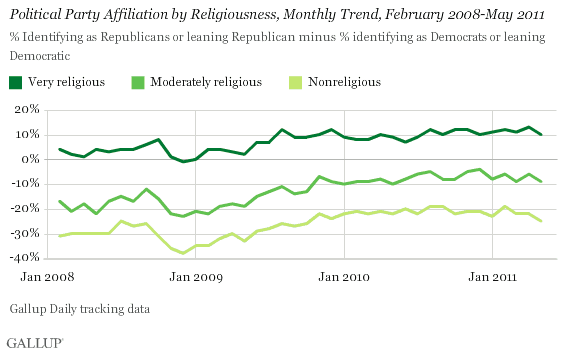 And here’s a chart showing the correlation between those groups and political affiliation:
And here’s a chart showing the correlation between those groups and political affiliation:
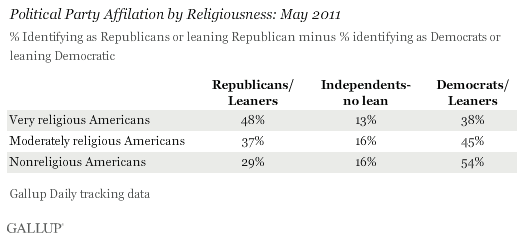 This can’t really be surprising, can it? We’ve known since roughly the 1980s that people who consider themselves “very religious,” especially non-Catholic Christians in that category, are more likely to be Republican than Democratic. At the same time, though, if you look at the numbers, they don’t make up a majority in the GOP. Nearly 40% of Republicans consider themselves only “moderately religious” and nearly a 1/3 of Republicans describe themselves as nonreligious. More interestingly, though, is the fact that religious faith doesn’t seem to be that big an issue among Independents in one direction or another, which seems to be yet another signal to the GOP that attracting Independent voters means staying away from the social issues that are so important to those “very religious” voters.
This can’t really be surprising, can it? We’ve known since roughly the 1980s that people who consider themselves “very religious,” especially non-Catholic Christians in that category, are more likely to be Republican than Democratic. At the same time, though, if you look at the numbers, they don’t make up a majority in the GOP. Nearly 40% of Republicans consider themselves only “moderately religious” and nearly a 1/3 of Republicans describe themselves as nonreligious. More interestingly, though, is the fact that religious faith doesn’t seem to be that big an issue among Independents in one direction or another, which seems to be yet another signal to the GOP that attracting Independent voters means staying away from the social issues that are so important to those “very religious” voters.
So, there’s nothing very surprising in this poll in terms of the results. However, there is potentially a lesson here for the GOP not dissimilar from others that we’ve seen. Whether they’ll listen to that lesson or nor is another question.
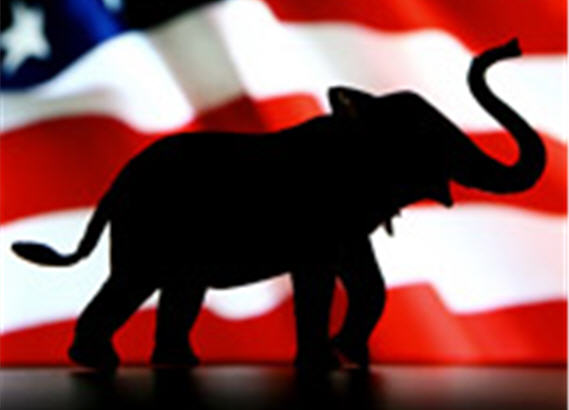


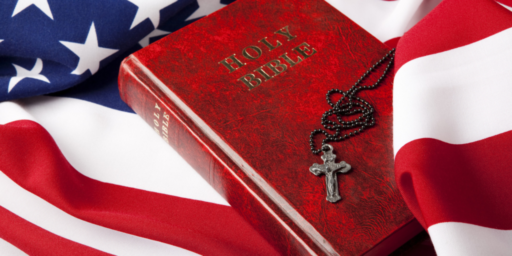

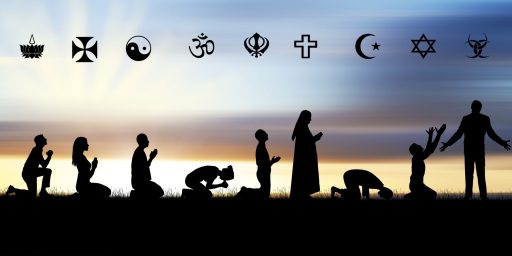

@Doug: “Sometimes, I wonder why pollsters do research on some topics”
As someone with inside knowledge of the inter-workings of a major polling firm, let me shed some light on this mystery: A client pays them to do so.
And to establish proof of what ‘everybody knows’, especially current proof (something true twenty years ago might be so today).
Doug,
You mention that we’ve known since the 1980’s that religious people trend Republican.
What happened in the 1980’s, perhaps in Philadelphia MS?
It’s nice to see the decent religious Americans starting to win their war against America’s religious fanatics.
Davebo:
Ooooh oooh! I know!
Is it, Reagan went there to signal that his GOP would continue the appeal to southern bigots begun by Nixon?
“Nearly 40% of Republicans consider themselves only “moderately religious” and nearly a 1/3 of Republicans describe themselves as nonreligious.”
and about 50% of republicans considered themselves very religious. This accounts for 120% of republicans/ leaners. Your analysis of the numbers is messed up this time.
@Laurie:
Yup.
From the Gallup article we get:
From that we get:
R
48% of 41% = 19.68% (50.3%)
37% of 29% = 10.73% (27.4%)
29% of 30% = 08.70% (22.2%)
D
38% of 41% = 15.58% (34.8%)
45% of 29% = 13.05% (29.1%)
54% of 30% = 16.20% (36.1%)
I
13% of 41% = 05.33% (36.1%)
16% of 29% = 04.64% (31.4%)
16% of 30% = 04.80% (32.5%)
So, 50.3% of Republicans are very religious, which is a slim majority, only 22.2% are nonreligious.
On the other hand Democrats, and even more so Independents are more evenly distributed.
36.1% of Democrats are nonreligious, but 34.8% are very religious, I’d say that looks like a bigger tent.